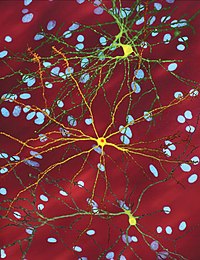
Photo from wikipedia
Background: Huntington's disease (HD) is characterized by early involvement of the striatum. It affects the pace of repetitive motor activity, as motor timing depends on basal ganglia activity. However, data… Click to show full abstract
Background: Huntington's disease (HD) is characterized by early involvement of the striatum. It affects the pace of repetitive motor activity, as motor timing depends on basal ganglia activity. However, data are lacking on the impact of this process on auditory time perception in motor non‐affected gene carriers. Objective: This work aims to test the performance in time perception of a group of mutation carriers, either without motor symptoms or at an early stage of motor involvement. This should allow designing therapies targeting compensation strategies and possibly be used as a disease progression marker. Method: Time was assessed using two different tasks. An absolute, duration‐based time perception was assessed in a first task and a relative, beat‐based time perception was assessed in a second one. HD‐mutation carriers with low‐to‐middle grades of motor involvement (HD‐motor, n = 10) or without motor signs (HD‐premotor n = 21), were compared with age‐ and sex‐matched healthy controls (control (n = 27)). Thresholds of time difference perception where assessed. Results: For both tasks, poorer performances were found in HD‐motor patients as compared with HD‐premotor and controls. Thresholds of time difference perception correlated positively with the CAP score for the whole group of HD‐gene carriers in both tasks. In a post‐hoc exploratory analysis performed by a multiple regression, a negative correlation was found between the thresholds in both tasks and the Stroop interference test. Furthermore, in the first task, a positive correlation was found between thresholds and a trail making B test and a negative one with a total functional score. Conclusion: Our data confirm that the impairment in time perception in persons affected by HD correlates with the advancing disease. They also suggest that time perception depends on similar cognitive mechanisms as the ones sub‐serving the Stroop interference test. HighlightsCortico‐striatal pathways are involved in time perception.Time perception is impaired in HD, in line with striatal involvement early in disease process.Impaired time perception is related to the disease burden.Assessment of time perception might be helpful in measuring disease progression.
Journal Title: Neuropsychologia
Year Published: 2018
Link to full text (if available)
Share on Social Media: Sign Up to like & get
recommendations!